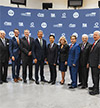Critical Site Selection Factor #4: Available Buildings Needed for Expedited Timetables
Locating in an existing building will save a company time and money.
Q4 2015
Building availability has become an increasingly important site selection factor for most companies looking to expand or relocate. In todays fast-paced business climate, companies often face sudden and unexpected issues that require a quick response. In addition, says Larry Gigerich, managing director for Ginovus, a site location firm based in Indianapolis, Indiana, after the recent five-year economic downturn, most companies are still waiting as long as they can before making a decision to invest capital. When they do decide to do something, they will want to move forward as fast as possible after making the decision.
It takes less time to move into an existing building than to build a new one, especially if the existing building offers the internal infrastructure the company needs (or can be upgraded quickly at reasonable cost) and is close to transportation connections or the location the company seeks. This saves considerable time and expense compared to constructing a new building. Most companies, if they can find an existing building that works for them and they can take occupancy quickly, will select the existing building instead of constructing a new facility.
Existing Buildings Are a Big Draw
Businesses must be agile and responsive to marketplace conditions and customer needs to enjoy sustainable success. The ability to expand, re-size, or open a new facility on an expedited timetable is essential. As a result, the availability of quality existing buildings in a community and state is critically important for an area to compete for a project, says Gigerich. A build-to-suit facility often is not possible in this era of tighter timetables. It is easier to make quick decisions when quality facilities are available in a location.
Businesses must be agile and responsive to marketplace conditions and customer needs to enjoy sustainable success. The ability to expand, re-size, or open a new facility on an expedited timetable is essential. Larry Gigerich, managing director for Ginovus The numbers and types of quality buildings that are available can vary from market to market. In some cases, an older, redeveloped industrial building can be a good fit, while for other projects a new, custom-designed building is the best option for a company. For example, a market well-positioned for the logistics industry may need to have an inventory of larger industrial buildings with higher ceiling heights, a certain number and size of truck bays, and interstate/highway access nearby, adds Gigerich. Markets focused on growing and attracting information technology companies need flexible and expandable space to accommodate start-ups and well-established technology companies alike.
Planning for the Future
Real estate developers, economic development officials, local and state governmental entities, utilities, site selectors, and corporate users can collaborate to identify and plan for future business needs of a region or community. This will ensure that an area has the required real estate and buildings necessary to stimulate growth and attract and retain companies, says Gigerich.
An increasing number of companies are also showing interest in being inside the city, often downtown or in a historic part of town, where there is very little space (if any) that is available for new construction. According to a 2014 report by Smart Growth America and Cushman & Wakefield, more companies are setting up in walkable downtown locations to attract and retain workers, build brand identity, and be closer to customers and business partners.
These companies select a walkable downtown location to help them better compete for talent and resources, says Geoff Anderson, president and CEO of Smart Growth America. That tells us two things. First, that creating these kinds of places is a crucial economic development strategy for cities. And second, that companies which havent considered a walkable location may be at risk of falling behind.
Project Announcements
Kimberly-Clark Expands Aiken County, South Carolina, Distribution Operations
05/04/2025
Aerowerks Plans Gaffney, South Carolina, Manufacturing Operations
05/04/2025
Sweden-Based Troax Group Plans Portland, Tennessee, Manufacturing Operations
05/04/2025
Kimberly-Clark Corporation Plans Warren, Ohio, Manufacturing Operations
05/04/2025
Denmark-Based Novonesis Expands Salem, Virginia, Production Operations
05/04/2025
Polyvlies USA Expands Winston-Salem, North Carolina, Manufacturing Operations
05/04/2025
Most Read
-
Run a Job Task Analysis
Q4 2024
-
39th Annual Corporate & 21st Annual Consultants Surveys: What Business Leaders and Consultants Are Saying About Site Selection
Q1 2025
-
The Location Economics of Advanced Nuclear
Q1 2025
-
Why Workforce Readiness Can’t Wait
Q1 2025
-
Power, Policy, and Site Selection in 2025
Q1 2025
-
Is It Time to Start Planning for Quantum Data Centers?
Q1 2025
-
Top States for Doing Business in 2024: A Continued Legacy of Excellence
Q3 2024



